Vietnam and Norway strengthen cooperation in marine aquaculture industry
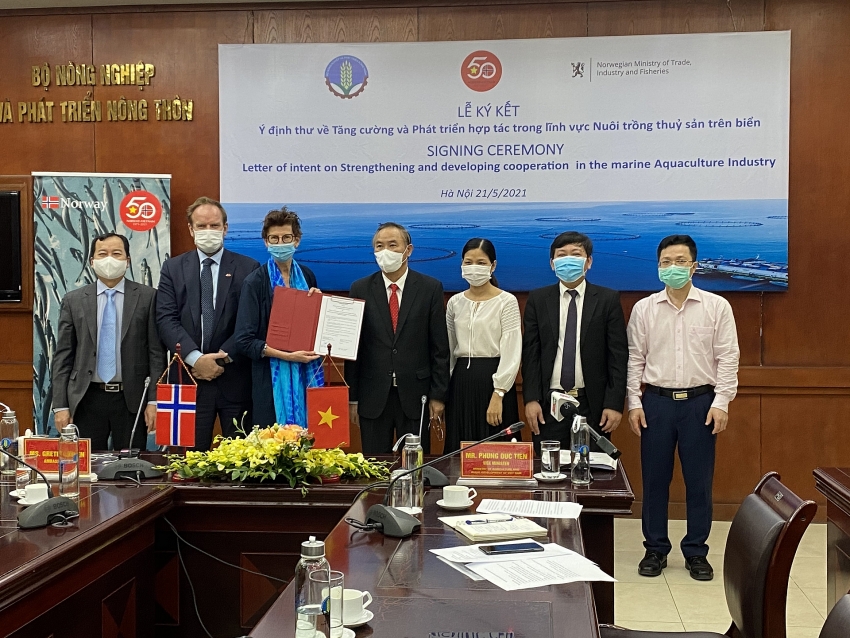 |
| The signing ceremony of Letter of Intent between the Norwegian Ministry of Trade, Industry and Fisheries (MTIF) and MARD on strengthening and developing cooperation in marine aquaculture industry |
The webinar was followed by the signing ceremony of a Letter of Intent between the Norwegian Ministry of Trade, Industry and Fisheries (MTIF) and MARD on strengthening and developing cooperation in the marine aquaculture industry.
These activities mark the 50th anniversary of the diplomatic ties between Norway and Vietnam (1971-2021), and to celebrate nearly four decades of bilateral cooperation between the two countries in the fisheries sector.
The webinar spotlighted Norway’s Ambassador to Vietnam Grete Løchen and Deputy Minister of Agriculture and Rural Development Phung Duc Tien. The event virtually welcomed over 150 participants from Vietnam and Norway, including representatives from MTIF, the Vietnamese Ambassador to Norway, MARD, the departments of fisheries of Norway and Vietnam, Innovation Norway Hanoi, VCCI, 10 coastal provinces in Vietnam, international organisations such as the World Bank, ADB, FAO, financial and credit institutions, as well as a large number of Vietnamese and Norwegian businesses.
In her opening remarks, Ambassador Grete Løchen said, “2021 is a special year for Norway and Vietnam. We both take pride in the bilateral cooperation in the fisheries sector over the past time. Now we are looking into how we can promote trade and investments in marine aquaculture and fish farming in Vietnam. When it comes to the sustainable development of marine aquaculture industry, Norway has a lot to offer based on our lessons learned from the well-known salmon industry.”
The webinar offered a forum for stakeholders to exchange information and experience about key factors that decide the success of a marine aquaculture industry, which span from planning and policy-making including credit policies, governance, human resources, and vocational training and green technologies and smart solutions to enable businesses to invest and contribute to make the industry profitable, sustainable, and environmentally friendly.
Norwegian speakers presented the Norwegian triangle model that coordinates the engagement of authorities, industry, and academia and is seen as one of the success factors of Norway’s salmon industry.
In the COVDI-19 context, this event is a good opportunity for Vietnamese and Norwegian companies to keep in touch, get to know each other better, and start planning for their future cooperation.
According to Deputy Minister Phung Duc Tien, over the last four decades, Norway has provided significant technical assistance to Vietnam’s fisheries sector. The bilateral cooperation between the two countries has brought great benefits to both economies and helped to deepen the good cooperation between the two countries.
“On the basis of this signed Letter of Intent, we will facilitate and support our authorities, academia, and businesses in their cooperation for the development of the marine aquaculture industry. Cooperation activities might be sharing and assisting in law enforcement and technological reforms; building capacity and research cooperation; promoting trade and investment cooperation among companies; encouraging exchanges of business visits to take part in fairs and exhibitions on marine aquaculture,” he emphasised.
Ambassador Grete Løchen noted that, “Sustainable and developed marine aquaculture industry is of great potential and thus requires a thinking of technology, green, and cost-effective solutions. This is another step to boost Norway-Vietnam cooperation in this sector. To succeed, we need to cooperate, and I believe Norway and Norwegian businesses are ready to cooperate and share.”
Vietnam’s fishery strategy for 2021-2030 with vision to 2045 approved by the prime minister in March 2021 sets out a number of targets including to reduce the intensity of ocean resources exploitation and to develop marine aquaculture in the appropriate areas; develop Vietnam’s fisheries sector to be modern and more competitive, able to integrate with the global value chain, to bring together authorities, industry and other organisations to tap into the potential and take advantage of the oceans in a responsible and sustainable way.
“To reach the above targets, marine aquaculture on an industrial scale is a solution. Therefore, the practical lessons, high-tech solutions as well as investments from Norwegian companies would be very helpful," said DFish director general Dr Tran Dinh Luan.
What the stars mean:
★ Poor ★ ★ Promising ★★★ Good ★★★★ Very good ★★★★★ Exceptional
Related Contents
Latest News
More News
- Aussie Beef Mate Club launched in Vietnam (February 23, 2023 | 10:32)
- Dragon Capital Vietnam helps research Ca Mau Mangroves and Pu Mat National Park (November 22, 2022 | 13:46)
- Vietnam promotes sustainable agriculture (July 26, 2022 | 10:30)
- Mekong Delta Resilient Business Network officially debuts (May 09, 2022 | 09:07)
- Vietnam approves development scheme for seafood processing in 2021-2030 (August 18, 2021 | 16:45)
- HCM City develops support industry (March 12, 2018 | 15:25)
- Dekalb Vietnam delivers spring warmth to Son La farmers (February 05, 2018 | 16:26)
- Monsanto’s answer to Vietnam’s burgeoning nutrition demand (November 07, 2017 | 16:22)
- Dekalb Vietnam: four years of fostering talent (October 29, 2017 | 21:34)
- GM corn: the future of global farming 1 (September 14, 2017 | 16:04)

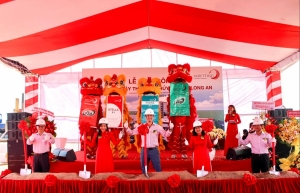
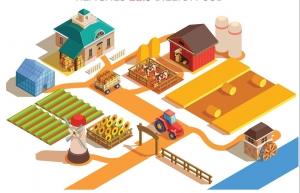
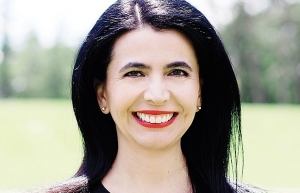
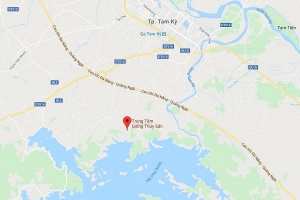
 Tag:
Tag:























 Mobile Version
Mobile Version